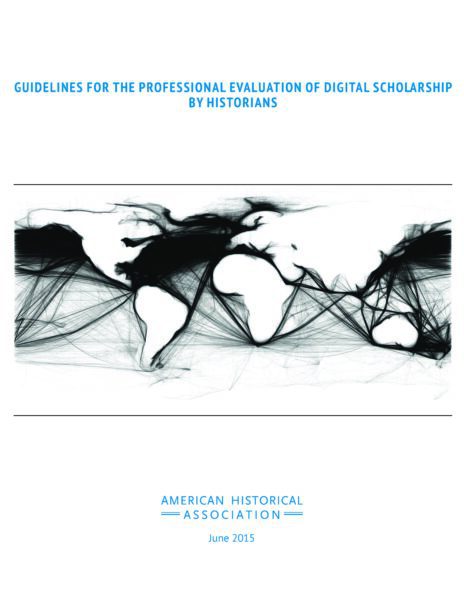With greater numbers of historians making contributions to scholarship through digital means, the discipline must grow to encompass the variety of formats and media available in the rapidly evolving digital environment.
We can only do so by giving proper credit for work on digital projects that contribute to historical knowledge. To encourage these developments in our discipline the AHA has published Guidelines for the Professional Evaluation of Digital Scholarship by Historians.
The guidelines encourage departments to evaluate such work on its scholarly merits: “Work done by historians using digital methodologies or media for research, pedagogy, or communication should be evaluated for hiring, promotion, and tenure on its scholarly merit and the contribution that work makes to the discipline through research, teaching, or service.” When there are good reasons for presenting historical scholarship in new formats or media, scholars should be encouraged to do so.
The guidelines focus on the contribution scholars and their work make to the “documented and disciplined conversation about matters of enduring consequence” that characterizes historical scholarship. Professional decisions (hiring, tenure, promotion) are made on the basis of a promise or demonstration of a scholar’s ability to advance that conversation. This contribution is evaluated in different ways that depend upon the institutional context, and in order for the guidelines to be as broadly applicable as possible, departments are encouraged to apply them to their own circumstances.
The AHA developed these guidelines through an open, iterative process, sharing public drafts at several stages in the process. This approach led to improvements such as the addition of a recommendation to departments that they look at work on grant proposals as a form of peer review when reviewing projects and contributors.
The guidelines themselves define a social contract between the individual and the department. The scholar producing digital work and the department each have responsibilities. Departments face problems in a number of areas, including appraising collaborative work, specifying what will count toward promotion and tenure, and the possibility of a lack of expertise within the department. Individual scholars, for their part, need to be as explicit as possible about the advantages of utilizing digital methodologies.
Following the recommendation of the committee, we are establishing a digital history working group that will be available to advise on these issues. The AHA will also develop materials to provide further guidance, such as a “curated gallery of ongoing digital scholarship so that historians can learn directly from one another as they conceive, build, and interpret new forms of scholarship.”
Just as methodological turns in the past few decades enriched our discipline and gave us new analytical tools for understanding how human society has changed, digital methods can illuminate new facets of history and enhance the impact of our work. Ultimately, as the guidelines state, “the goal of the Association and of the committee is to align our best traditions with our best opportunities.” These guidelines and the digital history working group are an important step toward fostering that alignment.
A version of this post appeared in the September 2015 issue of Perspectives on History.
This post first appeared on AHA Today.
Seth Denbo oversaw the publication department of the AHA and worked to develop innovative digital projects to enhance the organization’s mission. He earned his PhD from the University of Warwick and is a cultural historian of 18th-century Britain.
This work is licensed under a Creative Commons Attribution-NonCommercial-NoDerivatives 4.0 International License. Attribution must provide author name, article title, Perspectives on History, date of publication, and a link to this page. This license applies only to the article, not to text or images used here by permission.



